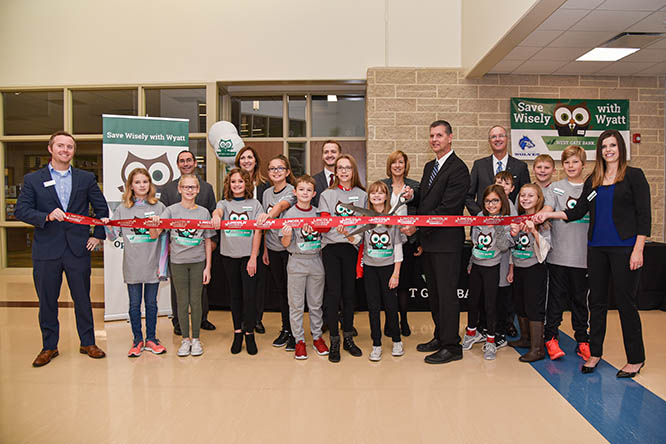In a financially complex world, Randy Oltman, principal at Wysong Elementary knows his students need to learn to take care of money and understand the importance of savings. When he heard about the In School Savings Program coordinated locally by the University of Nebraska–Lincoln Center for Economic Education, Oltman believed he found the best way to instill those values in his students.
“Kids need to start learning early about financial literacy. A lot of children have very short-term goals, as some adults do, with money and savings. Helping them realize a longer-term goal of something they want to accomplish or save for starts with very small amounts of savings and planning,” he explained.
With goals to teach students how to become savers and how financial institutions operate, Oltman collaborated with center director Dr. Tammie Fischer, who led a four-month planning process involving Wysong school faculty and representatives from West Gate Bank, to create a school branch. With a scheduled opening in November, they planned for the branch to open once a week during the school year for savings deposits starting at $1. West Gate Bank offered to match initial student deposits up to $5 to get them started. Teachers at Wysong interviewed and selected student tellers who West Gate staff then trained. Students in grades 3-5 received targeted savings lessons to prepare for their participation.
The center previously assisted eight other elementary schools in the Lincoln Public Schools district to open branches through school and bank partnerships. In each case, a school partners with a local financial establishment, and uses the program framework provided by the center. Oltman believes the In School Savings Program enables children to establish a saving habit early they will want to continue.
 Wysong’s In School Savings Student Branch opened this fall with a ribbon cutting ceremony.
Wysong’s In School Savings Student Branch opened this fall with a ribbon cutting ceremony.
“I knew some other schools in Lincoln Public Schools were participating in the program. I didn't know a lot about it, but I knew the opportunity was there. We decided to take this on because we thought it would be a great learning opportunity for the students, who are making deposits and learning to save,” said Oltman. “We are building a community of economically literate students here at Wysong and want our children to become savvy savers.”
With 31 schools in Nebraska participating, the In School Savings Program impacted Nebraska’s youth since the first student branch began in 2002. The center’s parent organization, the Nebraska Council on Economic Education, recently surveyed students statewide who previously took part in the program. The results highlight its success to promote financial literacy and economic education in the state.
“Research shows that savings habits form at an early age. Students who participate in this program, once in high school, are more likely to be banked, have jobs while in high school and save at higher rates than students who didn’t participate in the elementary program,” said Fischer, who also serves as an assistant professor of practice in economics at the Nebraska College of Business, where the center is housed.
The center’s work expands beyond student programs to also providing professional development for teachers and college faculty to become better economics instructors. Each of the center’s initiatives share the common goal to ultimately help people develop economic ways of thinking and problem-solving that they can use in their daily lives as consumers, savers, investors and responsible citizens.
“Economic and financial literacy allows us to understand the everyday world around us. It enables us to understand people, businesses, markets and governments. It also gives us the ability to make informed financial decisions and improve the financial well-being of future households,” said Fischer.
To learn more about the Lincoln Center for Economic Education, visit their website. Or view Nebraska elementary schools participating in the In School Savings Program and the financial establishments supporting them.
Published: January 15, 2020